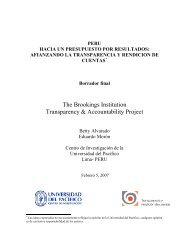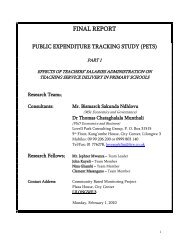Provider Purchasing and Contracting for Health Services_The Case
Provider Purchasing and Contracting for Health Services_The Case
Provider Purchasing and Contracting for Health Services_The Case
You also want an ePaper? Increase the reach of your titles
YUMPU automatically turns print PDFs into web optimized ePapers that Google loves.
intermediary <strong>for</strong> the District <strong>Health</strong> Management Teams <strong>and</strong> as a fund-holding agent <strong>for</strong> the<br />
secondary <strong>and</strong> tertiary service providers. Currently, the Ministry of <strong>Health</strong> is the principal<br />
<strong>and</strong> fund holder <strong>for</strong> the secondary <strong>and</strong> tertiary health services providers, while the District<br />
<strong>Health</strong> Management Teams are fund holders <strong>for</strong> primary health care providers.<br />
According to the findings, the contracting process has become quite blurred since the<br />
dissolution of the boards. <strong>The</strong> District <strong>Health</strong> Management Teams are unsure of both their<br />
own status as well as the status of the contracting arrangements <strong>and</strong> validity of the contracts<br />
being signed. Effectively, with the repeal of the <strong>Health</strong> <strong>Services</strong> Act of 1995 that led to the<br />
dissolution of the health boards (the Central Board of <strong>Health</strong>, the District <strong>Health</strong> Boards, <strong>and</strong><br />
the Hospital Management Boards), the District <strong>Health</strong> Management Teams became<br />
institutions under the Ministry of <strong>Health</strong> as part of the civil service structure, rather than<br />
autonomous government organizations. As such, the rationale <strong>for</strong> the creation of the<br />
purchaser-provider split appears to have been eliminated while the Ministry of <strong>Health</strong> has<br />
taken over the role of purchaser <strong>and</strong> commissions contracts. During the interviews, one of the<br />
managers observed the following:<br />
“We appear to have the historical arrangements still in existence as no one has<br />
yet to write to us officially as to the changes that have taken place. We<br />
there<strong>for</strong>e follow almost exactly the same systems as prevailed under the<br />
previous (decentralized) system of the CBoH <strong>and</strong> the <strong>Health</strong> Boards”.<br />
Action plan <strong>and</strong> budget completion<br />
<strong>The</strong> District <strong>Health</strong> Management Teams <strong>and</strong> Hospital Management Teams <strong>and</strong> the ministry<br />
all collaborate in the process of preparing the Medium Term Strategic Plans <strong>and</strong> also<br />
contribute to the government’s three-year <strong>for</strong>ward-rolling budgeting framework, known as<br />
the Medium Term Expenditure Framework. <strong>The</strong> annual action plans <strong>and</strong> budgets are<br />
developed from yearly revised framework budgets <strong>and</strong> the medium-term strategic plans.<br />
To evaluate the two systems of contracting, managers were asked to compare <strong>and</strong><br />
characterize the purchaser-provider split on a number of elements ranging from budgetary<br />
approval to evaluation. <strong>The</strong>se are discussed below:<br />
Budgetary process <strong>and</strong> funding modalities<br />
After the dissolution of the boards, the role of contracting between the providers <strong>and</strong> the<br />
Ministry of <strong>Health</strong> was shifted to management teams. Managers in all the District <strong>Health</strong><br />
Management Teams <strong>and</strong> hospitals observed that the budgetary <strong>and</strong> approval process has<br />
technically remained the same as be<strong>for</strong>e the dissolution of the boards. However, unlike under<br />
the provider-purchaser split arrangement, some of the districts <strong>and</strong> hospital managers<br />
observed that, although the budgets are approved, contracts are sometimes not signed by the<br />
Ministry of <strong>Health</strong>. This has raised questions about the validity of contracting in the health<br />
sector.<br />
Disbursement of funds<br />
<strong>The</strong> interviews revealed that the implementation of budgets under both systems has not been<br />
without difficulties. Particularly, managers observed that disbursements are characterized by<br />
inadequate <strong>and</strong> erratic monthly funding from the central level. While most managers<br />
47
















